Birmingham City Council has placed a group of Victorian workshops on Vyse Street in the Jewellery Quarter up for sale, prompting concern from jewellers, trade bodies and educators.
The decision was made without consultation with tenants or representative organisations, despite the area’s recent designation as a World Craft City.
The Jewellery Quarter is home to more than 700 businesses and is estimated to produce around 40% of all jewellery made in the UK. In 2022, it generated £767 million for Birmingham’s economy and contributed nearly £1 billion annually to the UK economy. The area has operated as a centre for jewellery production for centuries and remains one of the few locations in the world where multiple stages of jewellery manufacturing are carried out within a single district.
Unannounced Sale of Vyse Street Workshops
The Vyse Street buildings affected are two-storey brick workshops that accommodate a network of small manufacturing and service businesses involved in jewellery production. These include bullion suppliers, casters, setters, polishers and finishers, working in proximity to complete the full production process.
Tenants have stated that they received no prior notice of the sale and were unaware until “For Sale” signs were displayed. No formal communication had been made with local businesses, the National Association of Jewellers (NAJ), or the Jewellery Quarter Business Improvement District (JQBID).
Campaigners have linked the sale to broader gentrification pressures in the area. Over the past decade, an increasing number of industrial spaces have been converted for residential use, which has contributed to the displacement of skilled workers and impacted apprenticeship opportunities reliant on access to established workshops and craftspeople.
Industry Bodies Urge Council to Reconsider
Several trade organisations have responded by calling for the sale to be paused until proper consultation can take place.
Ben Massey, Chief Executive of the NAJ, said,
“The Jewellery Quarter is not just a commercial centre but an area with a longstanding history of craftsmanship and specialist trade. We urge the council to ensure the long-term sustainability of the area through effective planning and consultation with those directly involved in the trade.”
Roxanne Guest, Deputy Chief Executive at the Birmingham Assay Office, commented,
“Selling these Vyse Street buildings without consultation may disrupt the interconnected business environment that supports jewellery manufacturing in the area. The Jewellery Quarter is a specialised business district where skills and training are developed over time through close working relationships and local infrastructure.”
Political Scrutiny and Local Advocacy
The decision has been called in for review by Conservative councillors, including Deputy Lord Mayor Cllr Ken Wood, who said,
“The building sell-off puts the World Craft City ‘at risk’ but also risks the Jewellery Quarter’s unique ecosystem of businesses forever. Generations of business, relationships, training and knowledge will be lost if the council does not reverse its current decision.”
Luke Crane, Chief Executive of JQBID, added,
“Selling the buildings without safeguards for current tenants or heritage uses may lead to the loss of long-established business functions.”
Gary Wroe, Managing Director of Hockley Mint, stated,
“This is extremely disappointing. The lack of consultation or forward thinking by the council has sent shockwaves through the Jewellery Quarter. Let’s hope the council sees sense and works with local businesses to ensure continuity of trade and skills.”
Impact on Education and Future Skills
The School of Jewellery at Birmingham City University has expressed concern about how the sale could affect skills development and student transition into the trade.
Miranda Wells, Associate Professor in Gemmology, said,
“We are rightly proud of our long history as world leaders in jewellery manufacturing. Our industry works to preserve traditional techniques while also driving innovation. I hope the council will reconsider this decision and preserve these heritage buildings for future generations.”
Katy Tromans, Senior Lecturer and Course Director at the School, added,
“Students preparing for careers in the trade have typically relied on access to local workshops as part of their transition into industry roles. To see those spaces potentially removed with little notice is a cause for concern.”



